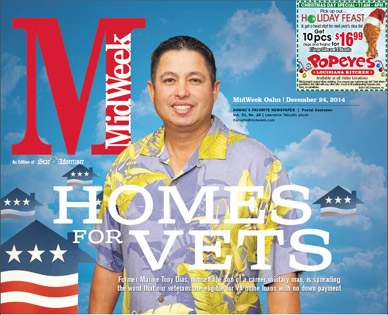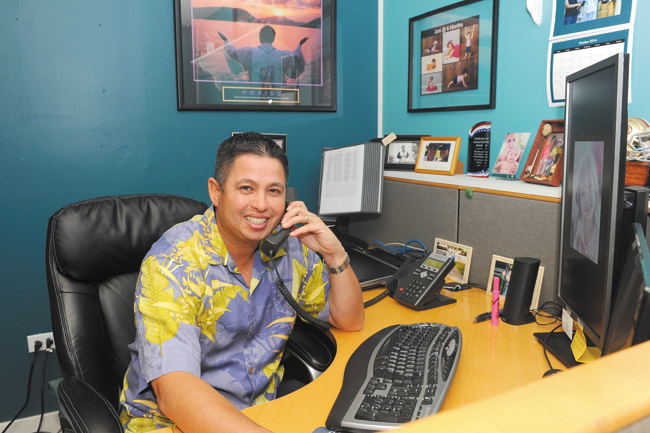Homes For Vets
Former Marine Tony Dias, himself the son of a career military man, is spreading the word that our veterans are eligible for VA home loans with no down payment
The adage “To the victors belong the spoils” may be dated, but it is timeless to Tony Dias. It means patriots who serve our country deserve rewards.
mw-cover-122414-hero-vetloans-1
Dias, an ex-Marine, today is a mortgage loan executive, and living proof that the adage applies in business as well as politics. As branch manager of Veterans United Home Loans of Hawaii, he specializes in a niche service that heralds the price of patriotism.
His target customer is a very specific slice of the American population. There are 22 million veterans in the United States, with 121,000 of them in Hawaii, according to the U.S. Department of Veterans Affairs (VA).
They are Dias’ passion and claim to fame for a kid from Waianae, who was inspired by the driven work ethic of his grandfather and the 25-year Marine career of his father.
When Dias became a mortgage specialist in 2003, he veered toward addressing the needs of military personnel.
“Those who serve and sacrifice so much to protect our country deserve to own part of it,” he thought.
“I studied conventional lending, FHA (government-backed housing loans), and VA loans,” Dias recalls. “The awareness of VA loans was low, and there was nowhere to go to find out about this entitlement.”
Mortgage Boot Camp
Yet, within a short period, Dias built up a clientele of veterans, thanks to his expert grasp of the nuances and complexities of VA-guaranteed loans.
“Few lenders ask about an applicant’s military service,” he says. “Yet it could be the one fact that qualifies for a 103.5-percent financed, no-down-payment, no-mortgage-insurance home loan.”
You read that right. No down payment.
“That’s crazy,” was Dias’ original reaction to the VA loan program. “Financing 100 percent of a home purchase with no mortgage insurance means saving $300 a month — that’s money in the bank.”
Before we get ahead in Dias’ story and examine the impact of VA loans on the housing market, let us back up to how this far-reaching reward for service personnel originated.
As many may be aware, the United States has the most comprehensive system of assistance for veterans of any nation in the world.
Following World War II, Congress enacted a large number of benefits for war vets, most significant of which was the GI Bill of 1944. It had a major impact on the American way of life.
The GI Bill offered vets low-cost mortgages, low-interest loans to start a business, cash payments of tuition and living expenses to attend university, high school or vocational education, as well as one year of unemployment compensation.
VA Home Loan Guaranty Program is the only provision of the original GI Bill that is still in force. It can be used by any vet who served after Sept. 16, 1940, as well as men and women on active duty, surviving spouses and reservists.
Here’s The Drill
A VA loan is not made directly by the federal government. Loans are made by conventional mortgage lenders, such as Dias’ company, and are guaranteed by the federal government.
The VA guaranteed nearly 540,000 loans in 2012, hitting an 18-year high. Since its inception, it has helped more than 20 million veterans and families with affordable home financing.
Kalaheo grad Dias and his staff of 32 proudly take credit for some of those closings.
“This year alone, we will close about 500 transactions,” Dias projects. “That represents about $225 million in loans. It’s the most powerful home purchasing program on the market. The same holds true for mortgage refinance.”
Here are some facts about VA loans that Dias likes to tout:
• They’re available despite foreclosure or bankruptcy.
• For primary residences only. No investment properties or fixer-uppers.
• Interest rates competitive with other loans.
• Guaranteed up to a quarter of loan amount by government.
• Funding fee waived for disabled vets.
The Few And Proud
With so many reasons to apply for a VA loan, why don’t more vets do so?
Aha. You knew there would be intrigue and irony to all this good news.
While VA loans give qualified vets a shot at the American dream of homeownership, recent statistics indicate that the VA loans program is underutilized.
One would think that, given economic conditions and the difficulty of making home purchases these days, that such a great program would be used widely.
Surprisingly, that does not seem to be the case. Dias blames low participation simply on a lack of promotion.
“Many loan officers don’t even ask potential clients if they are veterans,” he says. “Many veterans also don’t know about the program.”
Maybe it’s the fabled don’t-ask-don’t-tell mentality.
But if there is a champion of educating the public, it’s Dias, whose enthusiasm and popular seminars on Oahu and the Neighbor Islands make him the Tony Robbins of VA loans.
At the Veterans United office at 94-359 Puahi St. in Waipio and at real estate agencies in town, Dias is an avid spokesman for maximizing benefits earned by military personnel.
“Great communications and VA loan expertise are the cornerstones of our business,” says Dias, whose wife Joleen is a Realtor. They have two daughters and a grandson.
National parent company Veterans United, based in Columbia, Mo., recognizes the effectiveness of Dias’ educational seminars and taps him for sales presentations in other cities. The 47-year-old’s Marine warrior ethos makes him confident and committed to assignments.
As he exports his expertise to other markets, he has taken on a partner and co-branch manager in the person of Chris Cano, an ex-Navy nuclear submariner, who joined Veterans United two years ago. Together they will continue the popular educational seminars, charitable giving through the Veterans United Foundation funded by employees, and serving Hawaii’s home-buying vets.
Both are optimistic about the market outlook.
While projected total veteran population is on a decline — 23 million in 2010 predicted to drop to 14 million in 2014 — the current increase in use of VA loans can be attributed to the cessation of combat in Iraq and Afghanistan after more than a decade of hostilities.
With U.S. military action in that region coming to a close, members of the armed forces are rotating back home, many eager to resume civilian family life.
“New military vets are looking to buy a home,” Cano says. “And a VA loan is one of the easiest and most effective ways to do it.”
National mortgage experts note that the boom in civilian home loans, which remains the highest ever on record, dwarfs what is being seen by VA loan usage today.
It’s a positive sign, they claim, that the housing market is on the mend, with help from our nation’s vets. That’s music to Dias’ ears.
To the victors belong our thanks.







